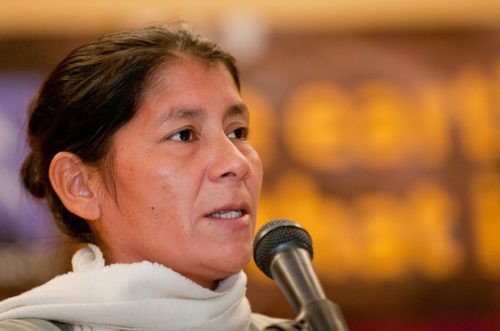Salvadoran activist takes her case to CanadaPosted Mar 25, 2013 |
|

Activist Vidalina Morales is traveling across Canada discussing mining issues in her home country of El Salvador. Photo: Council of Canadians
[Anglican Journal] When El Salvadoran anti-mining activist Vidalina Morales de Gámez travels across Canada to speak to Canadians about the effects of gold mining and the activities of Canadian mining corporations in her country, she brings photos.
A photo of the rust-colored San Sebastian River speaks volumes about the contamination it suffered, and died from, as a result of artisanal mining in the 1980s.
Then there are the photos of Salvadoran anti-mining activists Marcelo Rivera, Ramiro Rivera and Dora Sorto, who were murdered in 2009. Their cases, and that of another activist’s son who disappeared last year, remain unsolved, but their photos whisper about the courage required to say no and fight for the land and the people.
Morales, a mother of five children, is a member of the National Roundtable against Metal Mining in El Salvador (La MESA). Since 2006, she has worked on mining issues as an organizer in her home province of Cabañas. With help from a translator, she told a small audience at a March 19 event co-sponsored by the ecumenical social justice group Kairos in Toronto that opposition to mining began to gather momentum in El Salvador in 2004.
The event moderator, Karin Wells, a CBC journalist who has produced a documentary on the mining issue in El Salvador, mentioned that one independent report said 95 per cent of the country is geologically unstable. The country has also suffered landslides due to deforestation, and Morales said climate change has caused yet more damage.
In 2007, the Salvadoran government began to put restrictions on the mining industry, as a result of efforts made by La MESA and other civil society groups. A Canadian company, Pacific Rim, previously had been granted an exploration license, but the government later rejected its application to develop a mine.
Cabañas is one of the poorest provinces in El Salvador, Morales said, and mining companies have tried offering jobs to people and making alliances with various local authorities. “That was a part of their strategy to gain the support of the community members,” she said.
The situation escalated in 2006. “We began to receive threats and violence against our organization. They called us delinquents and [said] that we were against development,” Morales said.
“In 2009, on June 18, Marcelo Rivera, one of the first leaders we had, was murdered,” she recounted. “Six months later, Ramiro Rivera [no relation to Marcelo] was also murdered. Six days later, Dora Sorto was murdered. She was 36 years old, she had six children and was eight months pregnant at the time. She was cruelly killed, just like the squadrons of death that were used in the 1980s. Last June, they disappeared the son of one of our leaders.”
“So, as Salvadorans, we are confronting violence and loss of life, but these companies decided to create lawsuits against the state,” Morales said. “They did this through the International Centre for Dispute Resolution. There are two lawsuits that are taking place right now. One from Pacific Rim, and the other from Commerce Group.” Pacific Rim is asking for more than $100-million in damages and for lost profits. “This is money that we’ve never seen invested in our communities,” said Morales.
A statement on Pacific Rim’s website states its position that the government in El Salvador invited and encouraged the company’s exploration, discovery and delineation of gold deposits in the country. Pacific Rim said that it submitted a plan for the mine that exceeded all applicable standards, and the government’s failure to grant permits to mine the gold has resulted in a loss of profits.
Stuart Trew, a trade campaigner for the NGO the Council of Canadians, another sponsor of the event, spoke after Morales. He explained that El Salvador is not alone in a situation that pits the right of a sovereign country to make policy decisions to protect its environment and public health against the rights of foreign investors.
Free trade agreements and foreign investment protection treaties have given multinational corporations more rights than citizens and governments, Trew said.
Similar investor lawsuits have exploded in the past 10 years, he said, “from a handful in the early 1990s to about 450 known cases today.” He noted that Ecuador lost one of the most expensive cases he has heard of when it was ordered to pay close to $1.77-billion to Occidental Petroleum after its government of Ecuador cancelled an oil and gas concession.
Trew said that Canada is currently facing about $5.5-billion in investor-state lawsuits. One example involves a $250-million suit from an American company after the government of Quebec placed a moratorium on hydro-fracking due to environmental concerns.
“I think we have a double duty to fight investor-state arbitration,” Trew said. “The double duty is we do it in solidarity with our friends in El Salvador and around the world, but also for our own sake in Canada, so we and people around the world can no longer be extorted by companies who claim to have the right to dig, to build or to profit, despite what communities think of their projects.”
Trew added that there has been some backlash against investor arbitration recently: “First [from within] the legal community itself, arbitrators are coming out and speaking out against it.” There has been a global call for states to review, reform or withdraw from such investment treaties, he said. Trew also noted Australia’s recent decision to no longer sign such treaties.

Social Menu